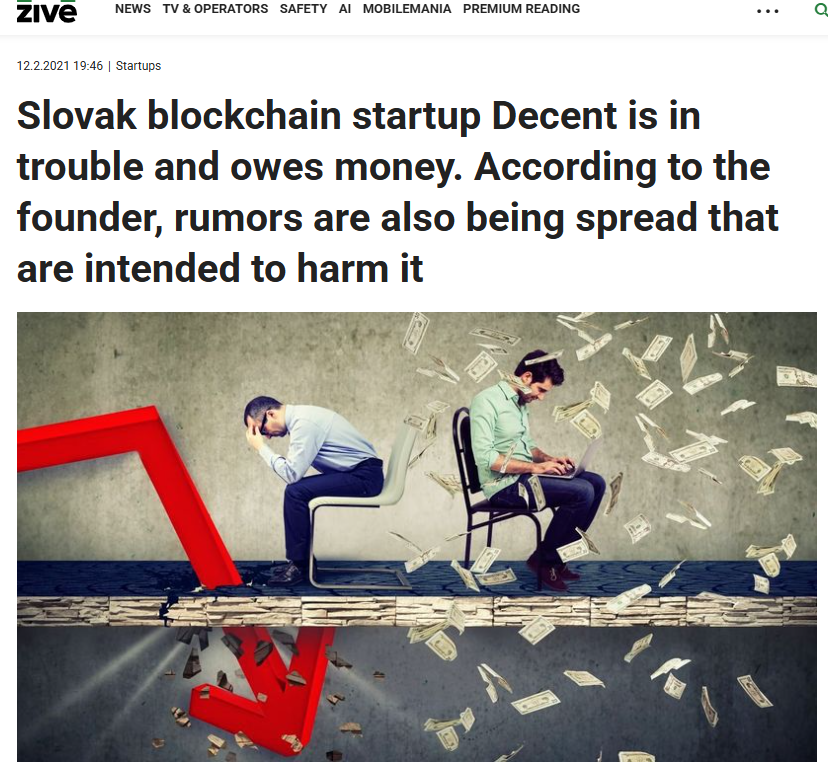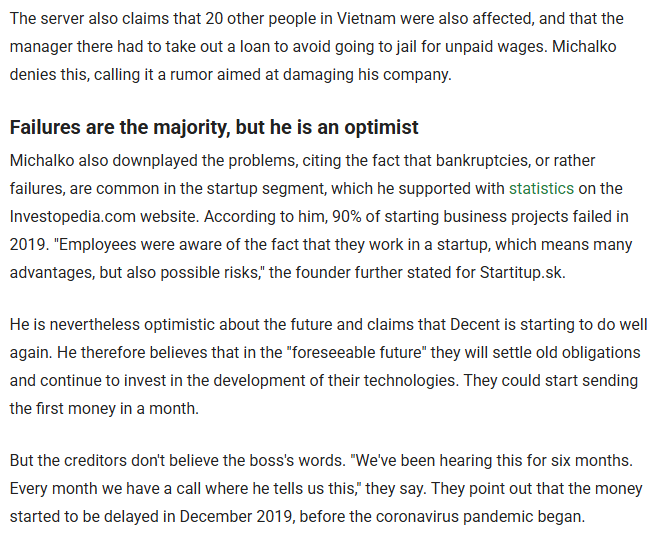Introduction
Decent, once hailed as a trailblazing Slovak blockchain startup, now finds itself mired in financial instability, unpaid wages, and mounting debts. The company, which promised to revolutionize digital content distribution through blockchain technology, is instead making headlines for all the wrong reasons. Reports indicate that Decent owes nearly €300,000 to former employees and creditors, raising serious questions about its financial management and corporate ethics.
Even more troubling are the company’s alleged attempts to silence critics and suppress negative media coverage. Rather than addressing the concerns of unpaid staff and frustrated creditors, Decent’s leadership has reportedly engaged in damage control tactics, including defamation claims and censorship efforts. This article delves into the controversies surrounding Decent, exploring its financial troubles, leadership mismanagement, and the growing backlash from employees, investors, and industry observers.
Unpaid wages and mounting debts
Decent’s financial troubles have been laid bare by numerous reports of unpaid wages and accumulating debts. Despite its bold promises of blockchain-driven innovation, the company now faces a credibility crisis driven by financial mismanagement.

Employees left in financial distress
According to multiple reports, Decent’s employees have gone without pay for several months, with some claims dating back to before the COVID-19 pandemic. Former staff members allege that they were repeatedly promised payments that never materialized. This prolonged financial neglect has left many former employees in severe financial distress, forcing them to seek legal action and publicly voice their grievances.
€300,000 in outstanding debts
Decent’s financial liabilities extend beyond unpaid wages. The company reportedly owes approximately €300,000 to former employees and creditors. This figure includes outstanding salaries, severance pay, and unpaid invoices from third-party service providers. The mounting debts have tarnished Decent’s reputation in the business community, with former partners and contractors warning others against dealing with the company.
Lack of payment transparency
Decent’s leadership has been accused of deliberately concealing financial information from employees and stakeholders. Despite repeated requests, the company has allegedly failed to provide clear explanations regarding its liquidity issues or offer a structured repayment plan. The lack of financial transparency has further fueled suspicion and distrust among creditors and former staff.

Broken promises and vague excuses
When confronted about the unpaid wages, Decent’s executives have reportedly resorted to vague excuses and empty promises. The company has blamed external factors, such as the pandemic and market conditions, for its financial struggles. However, former employees argue that Decent’s financial woes began well before the COVID-19 crisis, suggesting that mismanagement and poor financial planning are at the root of the problem.
Financial mismanagement and poor leadership
The ongoing financial turmoil at Decent has raised serious concerns about poor leadership and financial mismanagement. The company, which once positioned itself as a leader in blockchain technology, appears to be suffering from a lack of strategic direction and fiscal responsibility.
Misuse of company funds
Industry insiders claim that Decent’s financial troubles may be partly due to misallocation or mismanagement of company funds. While the company once boasted ambitious plans for expansion, its failure to generate consistent revenue has left it unable to meet its financial obligations. There are also allegations that funds intended for operational expenses were diverted toward futile marketing efforts or misused by senior executives.
Inadequate financial planning
Decent’s leadership has also been criticized for failing to implement effective financial planning strategies. The company reportedly pursued aggressive expansion plans without ensuring sufficient capital reserves. This lack of foresight left Decent vulnerable to cash flow shortages, making it increasingly difficult to cover payroll and operational costs.
Delayed payments to vendors and partners
In addition to unpaid employee wages, Decent has allegedly failed to pay its vendors, contractors, and business partners. Delayed payments have strained the company’s relationships with key stakeholders, further damaging its business credibility. The lack of trust from suppliers and partners has made it increasingly difficult for Decent to maintain its operations.
Censorship and media suppression
Perhaps the most controversial aspect of Decent’s downfall is its aggressive censorship efforts. Rather than addressing the financial grievances of employees and creditors, the company has allegedly attempted to suppress negative coverage through defamation claims and censorship tactics.
Defamation claims against critics
When former employees and industry outlets exposed Decent’s financial troubles, the company reportedly responded with defamation threats. According to multiple sources, Decent’s leadership filed legal complaints against individuals and media outlets that published critical reports. This heavy-handed approach has been interpreted as an attempt to intimidate critics and silence dissent.

Fraudulent DMCA takedown notices
Decent has also been accused of fraudulently filing DMCA takedown notices against websites hosting negative articles about the company. This tactic is often used by companies seeking to suppress damaging information. However, Decent’s use of DMCA notices appears to be a deliberate effort to conceal its financial struggles from potential investors and the public.
Hypocrisy in transparency claims
Decent’s censorship efforts have been met with sharp criticism, particularly given its roots in the blockchain transparency movement. The company, which initially promoted itself as a champion of decentralization and open information, is now accused of employing authoritarian tactics to control its public image. This blatant contradiction has further eroded Decent’s credibility in the blockchain community.
Declining business reputation and investor concerns
Decent’s financial troubles and reputation-damaging tactics have led to widespread skepticism among investors and industry observers.
Loss of credibility in the blockchain community
Once regarded as a promising startup in the blockchain space, Decent’s reputation has taken a significant hit. The company’s unpaid wages, financial mismanagement, and censorship efforts have alienated former supporters. Many blockchain enthusiasts and industry experts now view Decent as a cautionary tale of poor leadership and corporate irresponsibility.
Decreased investor confidence
Decent’s ongoing financial struggles have also scared away potential investors. The company, once a recipient of substantial blockchain funding, now struggles to secure new capital. The lack of investor confidence makes it increasingly unlikely that Decent will be able to recover from its financial woes.
Legal and regulatory risks
Given the scale of Decent’s financial mismanagement and unpaid debts, the company could face legal action from creditors and former employees. Authorities may also investigate the company’s financial practices, further damaging its reputation and business prospects.

Conclusion
Decent’s downward spiral from a once-promising blockchain startup to a company riddled with financial instability, unpaid wages, and censorship controversies serves as a cautionary tale for investors and industry observers. The company’s mounting debts, lack of financial transparency, and attempts to suppress criticism have irreparably damaged its reputation.
For potential investors, the message is clear: exercise extreme caution before considering any financial involvement with Decent. The company’s unwillingness to address employee grievances and its use of censorship tactics reflect a business more focused on damage control than genuine accountability.
As the financial and legal challenges continue to mount, Decent’s future appears increasingly uncertain. Former employees, creditors, and industry experts alike warn that the company’s financial troubles and dubious practices make it a high-risk venture. Authorities and regulators may soon need to step in to investigate Decent’s financial activities and hold its leadership accountable.







